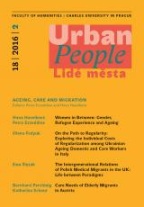The Intergenerational Relations of Polish Medical Migrants in the UK
Life between Paradigms
DOI:
https://doi.org/10.14712/12128112.3357Klíčová slova:
migration, intergenerational relations, solidarity, conflict, ambivalence, reciprocity, supportAbstrakt
The paper aims at analysing the effects induced by the migration of Polish people since 2004 on their families back in Poland. The emphasis is laid on intergenerational relations in the context of transnational families of the migrants. It asks how transnational families organise their lives and resources without spouses and fathers (mothers) in the country of origin, how they cope with their ageing parents and in-laws and whether they manage to maintain intimacy. The analysed group consists of health professionals who left for the United Kingdom in the period soon after the accession of Poland to the European Union. The paper first presents major theories of intergenerational relations, both in general and in reference to migrant families. Secondly, some information on the migration of Polish health professionals is given, as well as characteristics of the sample. Thirdly, the identified effects of migration within the migrants’ intergenerational relations is scrutinised.
Stahování
Publikováno
Jak citovat
Číslo
Sekce
Licence

Tato práce je licencována pod Mezinárodní licencí Creative Commons Attribution-NonCommercial-NoDerivatives 4.0.


